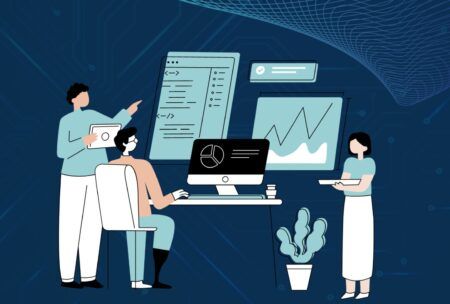979 students have accelerated their skills with this course
Limited Time Offer: Get All Access Pass For Only $9/Month
CLICK HERE TO START
Career Development Courses
Other Career Development Courses

Filters
Courses to get you started
Discover More In Other Career Development Courses
Filters
Other Career Development Courses

Ben Reuveni, the CEO and co-founder of Gloat, an AI-powered talent marketplace, expressed that careers are no longer ladders to climb. Instead of a linear progression, typically vertical, career development can happen in all directions as it reacts to the needs and demands of professionals and corporate entities. There will always be professional growth if you find room to grow.
Developing one's career is akin to growing a farm or garden—you have to start with planting the seeds. These seeds refer to the preparations you make to be marketable and competitive. Preparing well can give you bountiful chances for a fruitful future.
Some of the most critical preparations you could make are what people perceive as primary. Although it is true, the so-called "basics" can take you far and will set solid foundations for your upcoming endeavors. Some of the most critical preparations involve improving one's interview skills, writing impeccable resumes and cover letters, and mastering soft skills.
Everyone's career story is different, and people have their own goals. Although it is helpful to look at how others succeeded, finding unique ways to fit your circumstances is integral. With over 3000 online courses, Skill Success can give you multiple customizable options to succeed in your career.
Developing one's career is akin to growing a farm or garden—you have to start with planting the seeds. These seeds refer to the preparations you make to be marketable and competitive. Preparing well can give you bountiful chances for a fruitful future.
Some of the most critical preparations you could make are what people perceive as primary. Although it is true, the so-called "basics" can take you far and will set solid foundations for your upcoming endeavors. Some of the most critical preparations involve improving one's interview skills, writing impeccable resumes and cover letters, and mastering soft skills.
Everyone's career story is different, and people have their own goals. Although it is helpful to look at how others succeeded, finding unique ways to fit your circumstances is integral. With over 3000 online courses, Skill Success can give you multiple customizable options to succeed in your career.
Most commonly asked questions about Other Career Development Courses
A career development class is a program that teaches students how to identify their career options, choose the ones that make the most sense to them, and find the best ways to attain career success. In addition, it equips learners with the knowledge and skills to survive the ever-competitive job market. While this class is most recommendable to fresh graduates and entry-level job hunters, it can also help experienced professionals who seek to advance in their careers.
Through technological development, career development courses are easy to find online. This format is convenient because professionals no longer need to attend school and can learn at home or in their workplaces. Besides, most of these classes are not time-consuming because they only span for a few hours.
Career development is a popular theme among online classes that you can find on almost every e-learning platform. However, not every course can offer quality education that can be valuable to you for a long time. It can be easy to waste your hard-earned dollars on empty, outdated, and impractical lessons.
Since seasoned career development experts create Skill Success courses, our platform can provide lectures that will support your professional development regardless of your chosen career.
Through technological development, career development courses are easy to find online. This format is convenient because professionals no longer need to attend school and can learn at home or in their workplaces. Besides, most of these classes are not time-consuming because they only span for a few hours.
Career development is a popular theme among online classes that you can find on almost every e-learning platform. However, not every course can offer quality education that can be valuable to you for a long time. It can be easy to waste your hard-earned dollars on empty, outdated, and impractical lessons.
Since seasoned career development experts create Skill Success courses, our platform can provide lectures that will support your professional development regardless of your chosen career.
The ultimate goal of career development courses is to teach professionals how to find a career most suitable for them and be successful in it. You can find these lessons in multiple classes. Mix and match the classes to fit your needs and goals.
Here are some of the most common topics you can learn:
1. Personal development. Personal development is a critical base any professional should build to achieve holistic success in any career path. It is a lifelong process of skill assessment and goal setting that prepares anyone for the challenges of professional life.
2. Professional development. After building character and knowing personal strengths and weaknesses, one can smoothly transition into professional development. Like personal development, it is a continuous process, but it focuses on improving one's professional competencies and ability to unlock several career opportunities.
3. Career planning. Career planning courses are intricate programs that teach students how to attain their professional goals and maximize their chances of career growth. This advanced tool helps learners meet conditions and timelines to compete with the best ones in the industry.
4. Career management. Professionals should know to implement their plans to promote professional advancement and better career opportunities. Courses on career management can also teach professionals how to deal with an organization and thrive with them.
Here are some of the most common topics you can learn:
1. Personal development. Personal development is a critical base any professional should build to achieve holistic success in any career path. It is a lifelong process of skill assessment and goal setting that prepares anyone for the challenges of professional life.
2. Professional development. After building character and knowing personal strengths and weaknesses, one can smoothly transition into professional development. Like personal development, it is a continuous process, but it focuses on improving one's professional competencies and ability to unlock several career opportunities.
3. Career planning. Career planning courses are intricate programs that teach students how to attain their professional goals and maximize their chances of career growth. This advanced tool helps learners meet conditions and timelines to compete with the best ones in the industry.
4. Career management. Professionals should know to implement their plans to promote professional advancement and better career opportunities. Courses on career management can also teach professionals how to deal with an organization and thrive with them.
The best online development class will suit your needs and assist you in achieving short-term and long-term goals. Therefore, it is impossible to choose one or a few that should be considered the "best." After all, people live with different circumstances, and what is best for others may not be agreeable for you.
After pondering which lessons and skills you want to unlock in a class, it is equally important to consider financial restraints. Some courses are free, while others can bill up to hundreds and thousands of dollars. If you are looking for more affordable versions, it is practical to choose online courses.
Another advantage of choosing online classes is that they are better suited for busy people. Learning about career development can be time-consuming, so working professionals should choose quick course options. Most online classes, even those that do not teach about career development, may only take a few hours to accomplish.
Fortunately, finding easy, quick, and affordable online courses are easy to find nowadays. Platforms like Skill Success offer amazing deals that do not break the bank but have top-grade lessons. So feel free to browse all existing options and follow a learning path that works best for your career development goals.
After pondering which lessons and skills you want to unlock in a class, it is equally important to consider financial restraints. Some courses are free, while others can bill up to hundreds and thousands of dollars. If you are looking for more affordable versions, it is practical to choose online courses.
Another advantage of choosing online classes is that they are better suited for busy people. Learning about career development can be time-consuming, so working professionals should choose quick course options. Most online classes, even those that do not teach about career development, may only take a few hours to accomplish.
Fortunately, finding easy, quick, and affordable online courses are easy to find nowadays. Platforms like Skill Success offer amazing deals that do not break the bank but have top-grade lessons. So feel free to browse all existing options and follow a learning path that works best for your career development goals.
Career development is a series of intricate and interdependent steps continuously looping into cycles. It can be a long and winding process that requires patience and stamina.
Most human resources management experts agree that career development has five stages. Each stage represents a period in a professional's life. Here is a sneak peek of every stage:
1. Exploration. Exploration refers to the introductory stage wherein a person dabbles in employment and tries different things to get familiar with their career-related interests. This stage happens before or during college, around the late teens to mid-20s for most people. Most people's career choices at this stage are temporary because they are only for work experience.
2. Establishment. In the establishment stage, people are starting to get serious about their careers and make more conscious choices about the industry and career responsibilities they should pick. Instead of mere part-time jobs or hobby-related sidelines, people start getting full-time and office-based jobs. Making mistakes and unexpected side turns can already result in severe consequences.
3. Mid-career. The mid-career stage is when people start to make permanent decisions on their career paths because most of them are already in a specific industry or job title for a while. At this point, people start to hustle big time. Since their career path is clearer, people become more ambitious and aim for greater heights.
4. Late career. After years of hustle and continuous skill-building, people start to mellow down and enjoy the perks of their positions. Most of the time, people are already in a managerial or executive positions during the late career stage. Many no longer find learning new things and climbing higher in the corporate ladder necessary or interesting.
5. Decline. Nothing lasts forever, and career development is no exception. After reaching the plateau of one's professional life, what follows is the decline. The decline stage, also known as the retirement stage, is when people start to let go of their positions and pass on legacies to younger professionals as they formally end their careers.
Most human resources management experts agree that career development has five stages. Each stage represents a period in a professional's life. Here is a sneak peek of every stage:
1. Exploration. Exploration refers to the introductory stage wherein a person dabbles in employment and tries different things to get familiar with their career-related interests. This stage happens before or during college, around the late teens to mid-20s for most people. Most people's career choices at this stage are temporary because they are only for work experience.
2. Establishment. In the establishment stage, people are starting to get serious about their careers and make more conscious choices about the industry and career responsibilities they should pick. Instead of mere part-time jobs or hobby-related sidelines, people start getting full-time and office-based jobs. Making mistakes and unexpected side turns can already result in severe consequences.
3. Mid-career. The mid-career stage is when people start to make permanent decisions on their career paths because most of them are already in a specific industry or job title for a while. At this point, people start to hustle big time. Since their career path is clearer, people become more ambitious and aim for greater heights.
4. Late career. After years of hustle and continuous skill-building, people start to mellow down and enjoy the perks of their positions. Most of the time, people are already in a managerial or executive positions during the late career stage. Many no longer find learning new things and climbing higher in the corporate ladder necessary or interesting.
5. Decline. Nothing lasts forever, and career development is no exception. After reaching the plateau of one's professional life, what follows is the decline. The decline stage, also known as the retirement stage, is when people start to let go of their positions and pass on legacies to younger professionals as they formally end their careers.
According to the Nebraska Department of Education, career development is crucial because it helps individuals discover who they are and what they are good at. Without relevant knowledge on career development, it is easy for people to feel frustrated and lost as they go through one job after the other.
Career development serves multiple uses for every individual, but its most significant purpose is guiding people through professional development. Everyone has goals and aspirations, so it is impossible to follow one path toward career advancement. However, competitive knowledge and experience in career development enable professionals to acquire complete control of their careers.
Besides, competency in career development is a critical fragment that perpetuates continuous personal and professional growth. A 2022 study revealed that in-depth knowledge of career development encourages employees to undergo skill-building training. As a result, professionals can feel more motivated because they can imagine a career trajectory wherein all the efforts they are pouring in will eventually benefit them.
After experiencing success in career development, professionals can become more confident about their worth and position. Work-related problems may no longer faze them that easily. This sense of security can engage anyone to voluntarily do better and achieve more outstanding feats in the future.
Career development serves multiple uses for every individual, but its most significant purpose is guiding people through professional development. Everyone has goals and aspirations, so it is impossible to follow one path toward career advancement. However, competitive knowledge and experience in career development enable professionals to acquire complete control of their careers.
Besides, competency in career development is a critical fragment that perpetuates continuous personal and professional growth. A 2022 study revealed that in-depth knowledge of career development encourages employees to undergo skill-building training. As a result, professionals can feel more motivated because they can imagine a career trajectory wherein all the efforts they are pouring in will eventually benefit them.
After experiencing success in career development, professionals can become more confident about their worth and position. Work-related problems may no longer faze them that easily. This sense of security can engage anyone to voluntarily do better and achieve more outstanding feats in the future.
Being in your thirties can be confusing; however, it should not prevent you from trying new things. If you decide to follow a different career path at this age—it is perfectly fine. While there are risks that you should consider, like financial stability and the competitiveness of the job marketplace, shifting to a new career is never impossible.
These tips may come in handy:
1. Reflect on yourself. Being 30 and changing a career path is not the end of the world, but it has many disadvantages. So instead of wallowing in the challenges, having a heart-to-heart conversation with yourself is better. Ask yourself your goals, wants, worries, negotiables, non-negotiables, and other factors that would impact your self-satisfaction.
2. Examine your professional development track. After performing a thorough self-assessment, the ideal next step would be looking at your career track. Your experience is your greatest asset when it comes to entering another career because you can repurpose your previously acquired skills and connections. Find new ways to utilize your professional background to access career goals.
3. Research before doing anything. Applying for a new job is like going to war, so you should always know the terrain you are treading. Researching is helpful because it will inform you of the industry's trends and expectations. Applicants who do not know these matters may struggle in standing out to and communicating with employers.
4. Learn new skills. If finding a job in the ever-competitive job marketplace means going to war, then new skills serve as your protective wear and artilleries. So, before approaching companies, always learn a new skill or two to remain relevant and competitive. Also, choose new skills that relate to the position you are aiming for.
5. Be open to changes. Change is hard, but you must accept it because you cannot survive a new professional environment without making a few adjustments. Change can mean many things, from letting go of old habits to having a new perspective. But no matter what you go through, always aim to change for the better.
These tips may come in handy:
1. Reflect on yourself. Being 30 and changing a career path is not the end of the world, but it has many disadvantages. So instead of wallowing in the challenges, having a heart-to-heart conversation with yourself is better. Ask yourself your goals, wants, worries, negotiables, non-negotiables, and other factors that would impact your self-satisfaction.
2. Examine your professional development track. After performing a thorough self-assessment, the ideal next step would be looking at your career track. Your experience is your greatest asset when it comes to entering another career because you can repurpose your previously acquired skills and connections. Find new ways to utilize your professional background to access career goals.
3. Research before doing anything. Applying for a new job is like going to war, so you should always know the terrain you are treading. Researching is helpful because it will inform you of the industry's trends and expectations. Applicants who do not know these matters may struggle in standing out to and communicating with employers.
4. Learn new skills. If finding a job in the ever-competitive job marketplace means going to war, then new skills serve as your protective wear and artilleries. So, before approaching companies, always learn a new skill or two to remain relevant and competitive. Also, choose new skills that relate to the position you are aiming for.
5. Be open to changes. Change is hard, but you must accept it because you cannot survive a new professional environment without making a few adjustments. Change can mean many things, from letting go of old habits to having a new perspective. But no matter what you go through, always aim to change for the better.
Advancing to newer and higher-level positions requires intensive skill development. It is not enough for professionals to learn theoretical lessons because complete career development only comes after mastering specific competencies.
If you want to upgrade your career and achieve more success at work, be prepared to learn the following skills:
1. Communication skills. No matter how good your ideas are, they will remain unutilized and unappreciated if you cannot communicate them to others. Always work on your communication skills because they are always integral to any career and position.
2. Problem-solving skills. Problem-solving skills are critical because they help with troubleshooting and creating solutions. It is one of the most relevant skills that any professional can master because it fosters adaptability no matter the existing crises.
3. Organizational skills. Organizational skills are still important whether you are managing a team or not. These skills help employees get their tasks done in an orderly manner. Thus, reducing work-related confusion and chaos.
4. Leadership skills. Employers favor job applicants with leadership affinity because they can bring out a team's full potential. They take the initiative to improve and consistently ensure everyone works on corporate goals.
5. Teamwork skills. Teamwork skills are underrated but always necessary. This skill enables professionals to work on different things, respect each others' boundaries, and accomplish the same goal. Ultimately, it fosters robust professional relationships within the company.
If you want to upgrade your career and achieve more success at work, be prepared to learn the following skills:
1. Communication skills. No matter how good your ideas are, they will remain unutilized and unappreciated if you cannot communicate them to others. Always work on your communication skills because they are always integral to any career and position.
2. Problem-solving skills. Problem-solving skills are critical because they help with troubleshooting and creating solutions. It is one of the most relevant skills that any professional can master because it fosters adaptability no matter the existing crises.
3. Organizational skills. Organizational skills are still important whether you are managing a team or not. These skills help employees get their tasks done in an orderly manner. Thus, reducing work-related confusion and chaos.
4. Leadership skills. Employers favor job applicants with leadership affinity because they can bring out a team's full potential. They take the initiative to improve and consistently ensure everyone works on corporate goals.
5. Teamwork skills. Teamwork skills are underrated but always necessary. This skill enables professionals to work on different things, respect each others' boundaries, and accomplish the same goal. Ultimately, it fosters robust professional relationships within the company.



































































